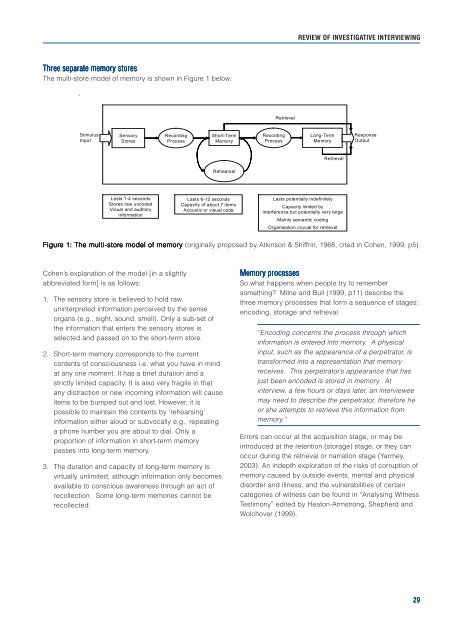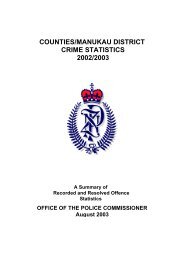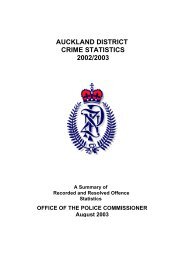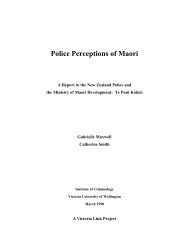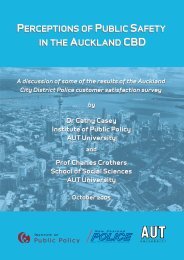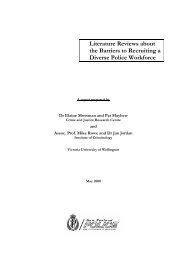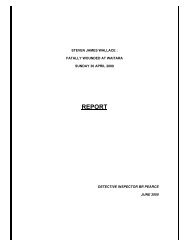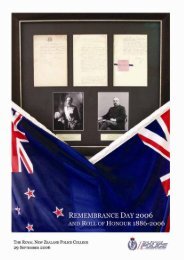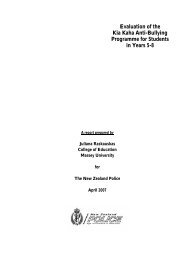Investigative interviewing: the literature - New Zealand Police
Investigative interviewing: the literature - New Zealand Police
Investigative interviewing: the literature - New Zealand Police
Create successful ePaper yourself
Turn your PDF publications into a flip-book with our unique Google optimized e-Paper software.
REVIEW OF INVESTIGATIVE INTERVIEWING<br />
Three separate memory y stores<br />
The multi-store model of memory is shown in Figure 1 below:<br />
Retrieval<br />
Stimulus<br />
Input<br />
Sensory<br />
Stores<br />
Recording<br />
Process<br />
Short-Term<br />
Memory<br />
Recording<br />
Process<br />
Long-Term<br />
Memory<br />
Response<br />
Output<br />
Retrieval<br />
Rehearsal<br />
Lasts 1-4 seconds<br />
Stores raw uncoded<br />
Visual and auditory<br />
information<br />
Lasts 6-12 seconds<br />
Capacity of about 7 items<br />
Acoustic or visual code<br />
Lasts potentially indefinitely<br />
Capacity limited by<br />
Interference but potentially very large<br />
Mainly semantic coding<br />
Organisation crucial for retrieval<br />
Figure 1: The multi-store model of memory (originally proposed by Atkinson & Shiffrin, 1968, cited in Cohen, 1999, p5).<br />
Cohen’s explanation of <strong>the</strong> model [in a slightly<br />
abbreviated form] is as follows:<br />
1. The sensory store is believed to hold raw,<br />
uninterpreted information perceived by <strong>the</strong> sense<br />
organs (e.g., sight, sound, smell). Only a sub-set of<br />
<strong>the</strong> information that enters <strong>the</strong> sensory stores is<br />
selected and passed on to <strong>the</strong> short-term store.<br />
2. Short-term memory corresponds to <strong>the</strong> current<br />
contents of consciousness i.e. what you have in mind<br />
at any one moment. It has a brief duration and a<br />
strictly limited capacity. It is also very fragile in that<br />
any distraction or new incoming information will cause<br />
items to be bumped out and lost. However, it is<br />
possible to maintain <strong>the</strong> contents by ‘rehearsing’<br />
information ei<strong>the</strong>r aloud or subvocally e.g., repeating<br />
a phone number you are about to dial. Only a<br />
proportion of information in short-term memory<br />
passes into long-term memory.<br />
3. The duration and capacity of long-term memory is<br />
virtually unlimited, although information only becomes<br />
available to conscious awareness through an act of<br />
recollection. Some long-term memories cannot be<br />
recollected.<br />
Memory y processes<br />
So what happens when people try to remember<br />
something? Milne and Bull (1999, p11) describe <strong>the</strong><br />
three memory processes that form a sequence of stages:<br />
encoding, storage and retrieval.<br />
“Encoding concerns <strong>the</strong> process through which<br />
information is entered into memory. A physical<br />
input, such as <strong>the</strong> appearance of a perpetrator, is<br />
transformed into a representation that memory<br />
receives. This perpetrator’s appearance that has<br />
just been encoded is stored in memory. At<br />
interview, a few hours or days later, an interviewee<br />
may need to describe <strong>the</strong> perpetrator, <strong>the</strong>refore he<br />
or she attempts to retrieve this information from<br />
memory.”<br />
Errors can occur at <strong>the</strong> acquisition stage, or may be<br />
introduced at <strong>the</strong> retention (storage) stage, or <strong>the</strong>y can<br />
occur during <strong>the</strong> retrieval or narration stage (Yarmey,<br />
2003). An indepth exploration of <strong>the</strong> risks of corruption of<br />
memory caused by outside events, mental and physical<br />
disorder and illness, and <strong>the</strong> vulnerabilities of certain<br />
categories of witness can be found in “Analysing Witness<br />
Testimony” edited by Heaton-Armstrong, Shepherd and<br />
Wolchover (1999).<br />
29


